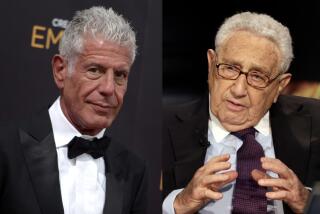Ex-German Chancellor Kurt Kiesinger
- Share via
FRANKFURT, West Germany — Kurt Georg Kiesinger, who served as West Germany’s third federal chancellor from 1966 to 1969 despite controversy over his Nazi past, died Wednesday of heart failure. He was 83.
Kiesinger spent 18 months in a postwar U.S. internment camp with other Nazi Party members, but he staunchly denied any wrongdoing during Adolf Hitler’s Third Reich and never was charged with any crimes.
In a widely publicized incident, Kiesinger was slapped in the face by Nazi hunter Beate Klarsfeld at a conference in West Berlin on Nov. 7, 1968.
Klarsfeld was convicted of causing bodily injury and insulting Kiesinger, and after receiving and appealing a one-year prison sentence, was given four months’ probation. She continued her bitter public criticism of Kiesinger.
Known as “King Silver Tongue” because of his powerful speaking style, Kiesinger retained his heavy Swabian accent. He was a Roman Catholic, born April 6, 1904, in Ebingen in Baden-Wuerttemburg.
As a 29-year-old lawyer, Kiesinger joined the Nazi Party in 1933, the year Hitler came to power. He said he became disillusioned with the party a year later because of the bloody purge of storm trooper leader Ernst Roehm and his associates.
During World War II, Kiesinger worked in the radio propaganda section of the Nazi foreign ministry and served as department head for part of the war.
Kiesinger’s Nazi past brought him much unfavorable publicity when he became a candidate for chancellor, and the sharp public debate continued during his term.
He always denied any wrongdoing and declared: “I have clean hands. I know what I did and what I did not do.”
In 1966, Kiesinger succeeded fellow Christian Democrat Chancellor Ludwig Erhard, forming the Grand Coalition of conservatives and Social Democrats.
Kiesinger sought more contact with the Communist states of Eastern Europe, breaking with past policy. He established diplomatic relations with Romania and Yugoslavia, but his overtures suffered a setback when the Soviets invaded Czechoslovakia in 1968.
He also overcame a troubling recession with a series of economic measures during his term.
More to Read
Sign up for Essential California
The most important California stories and recommendations in your inbox every morning.
You may occasionally receive promotional content from the Los Angeles Times.













